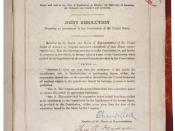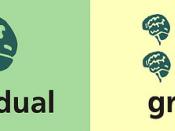Representative democracy is defined as a government in which officials are elected by the people. These officials are expected to govern as the majority of the people want. If this does not happen to the complete satisfaction of the voters, these officials can be voted out of office.
The concept of judicial review states that individuals appointed by high-ranking officials can determine the constitutionality of laws and actions passed by any individual on the country, specifically government agencies.
The idea of an appointed individual serving a lifelong term defies the principle of democracy, as these individuals cannot be punished for ruling against the wishes of the people. The only way to revoke the final ruling of the court system is by amending the Constitution. An amendment is a lengthy, tedious process that requires a large majority of the people to approve. The amending could also take several years, which would cause the suffering that caused the need for the amendment to continue for longer than necessary.
Due to the length and nomination process of a judge's time in power, the idea of judicial review contrasts greatly with the principles of a representative democracy.



Government
when we talk about governmental issues it needs more consentartion it was a good try but you can make it more comprehensive.
4 out of 4 people found this comment useful.